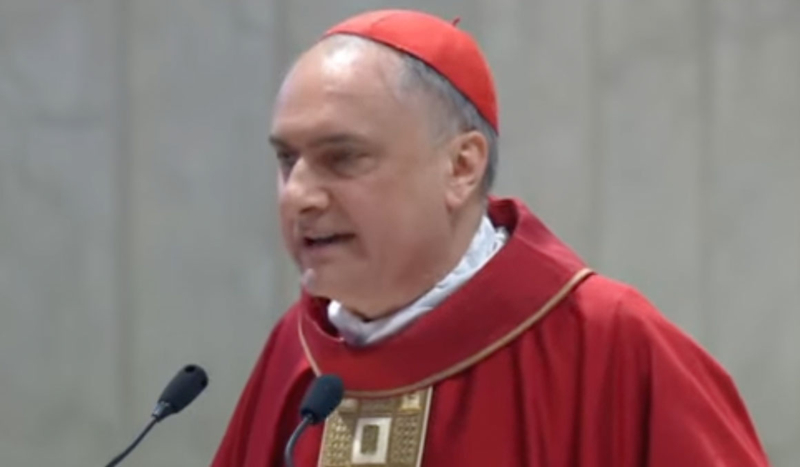
Vatican News / YouTube Screenshot
VATICAN CITY // On the fourth day of the Novemdiales — the nine days of mourning for Pope Francis — Cardinal Mauro Gambetti, archpriest of the Papal Basilica of St. Peter in the Vatican, presided over a solemn Mass at 5 p.m. April 29.
Addressing the Chapters of the Papal Basilicas gathered in St. Peter’s Basilica, Cardinal Gambetti reflected on the universal message of the Gospel and the Church’s enduring call to compassion, solidarity, and openness.
Drawing from the well-known Gospel passage of the Last Judgment, Cardinal Gambetti described it as “a grandiose scene with a universalistic character: all the peoples, who live together in the one field that is the world, are gathered before the Son of Man, seated on the throne of his glory to judge.”
He emphasized that the parable’s message is clear for all: “In the life of everyone, believers and non-believers alike, there is a moment of discrimination. At a certain point some begin to participate in the same joy of God, others begin to suffer the tremendous suffering of true loneliness, because, excluded from the Kingdom, they remain desperately alone in their souls.”
Reflecting on the imagery of sheep and goats, Cardinal Gambetti noted the deeper meaning preserved in the original Greek text, distinguishing the faithful, meek sheep from the independent, rebellious goats.
“The sheep, who do not rebel, are faithful, meek, take care of the lambs and the weakest of the flock, and enter the kingdom prepared for them since the creation of the world,” he explained. “The goats, who want independence, challenge the shepherd and the other animals with their horns… are destined for eternal fire. It is natural to ask: On a personal and institutional level, which of the two styles do we embody?”
Challenging the congregation to look beyond mere religious observance, Cardinal Gambetti stated, “Belonging or not to the Kingdom of God does not depend on explicit knowledge of Christ.”
At the heart of his homily, Cardinal Gambetti proclaimed the supreme dignity of human acts, rooted in compassion, solidarity, and tenderness. Quoting Italian contemplative theologian Elia Citterio, he said: “God wanted to be in solidarity with humanity to such an extent that whoever touches man touches God, whoever honors man honors God, whoever despises man despises God.”
Citing the Acts of the Apostles, he reminded the faithful: “God shows no partiality, but accepts from every nation those who fear him and do what is right.”
In a world “globalized, secularized, and thirsty for Truth and Love,” the cardinal said, the Church must follow Peter’s example of “openness to humanity without reservations, free interest in others, [and] sharing of experience to help every man and woman to give credit to life, to the grace of creation.”
Concluding his homily, Cardinal Gambetti invoked the example of Mary, “the humble handmaid of the Lord who gave the world the Savior,” praying that she might “show us the way of authentic discipleship and proclamation.”

